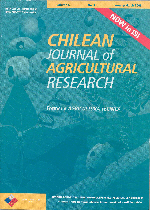
|
Agricultura Técnica
Instituto de Investigaciones Agropecuarias, INIA
ISSN: 0365-2807
EISSN: 0365-2807
Vol. 62, No. 3, 2002, pp. 375-395
|
 Bioline Code: at02036
Bioline Code: at02036
Full paper language: Spanish
Document type: Research Article
Document available free of charge
|
|
|
Agricultura Técnica, Vol. 62, No. 3, 2002, pp. 375-395
| es |
Caracterización de Sistemas Productivos Lecheros en la X Región de Chile Mediante Análisis Multivariable
Smith, Ricardo R.; Moreira, Víctor L. & Latrille, Luis L.
Resumen
Este estudio caracteriza y clasifica las explotaciones lecheras
de la Décima Región de Chile de acuerdo a aspectos técnicos,
productivos, y relacionados al capital humano con que ellas cuentan. Doscientos
noventa predios lecheros fueron encuestados y caracterizados mediante
diez variables cuantitativas y nueve cualitativas. Esta información
fue analizada mediante tres técnicas de estadísticas multivariable
exploratoria (análisis de componentes principales, de correspondencias
múltiples, y de conglomerados) para generar cuatro sistemas productivos.
El primer sistema productivo obtenido del análisis incluye predios
con un bajo nivel tecnológico, partos concentrados en primavera,
sin estabulación o confinamiento, carga animal de 0,62 UA ha
-1
, y una producción por vaca entre 741 y 1.547 L año
-1
. Las explotaciones en el segundo sistema productivo muestran partos concentrados
en otoño y primavera, un tiempo de confinamiento del rebaño
equivalente a 1,25 meses en el año, carga animal de 0,72 UA ha
-1
, y vacas que producen desde 1.617 a 3.112 L año
-1
. En el tercer sistema productivo, los predios distribuyen los partos
a través del año o bien los concentran en otoño y primavera;
estas explotaciones prácticamente no confinan el rebaño, tienen
una carga animal de 1,16 UA ha
-1
, y una producción anual por vaca entre 2.018 a 3.671 L. Las explotaciones
del cuarto sistema presentan los más altos niveles tecnológicos,
distribuyen las pariciones a lo largo del año, confinan el rebaño
un tiempo equivalente a 2 meses o más, tienen carga animal de 0,96
UA ha
-1
, y una producción anual por vaca entre 3.925 y 5.348 L.
Palabras-clave
predio lechero, sistemas productivos lecheros, estadística multivariable, análisis de correspondencias múltiples, análisis de conglomerados.
|
| |
| en |
Characterization of Dairy Productive Systems in the Tenth Region of Chile Using Multivariate Analysis
Smith, Ricardo R.; Moreira, Víctor L. & Latrille, Luis L.
Abstract
This study characterizes and classifies dairy farms from
the Tenth Region of Chile using technical, productive, and human capital
information. Two hundred and ninety dairy farms were surveyed and characterized
by ten quantitative and nine qualitative variables in 1997. The collected
information was analyzed using three multivariate exploratory statistical
methods (principal component analysis, multiple correspondence analysis,
and cluster analysis) to generate four dairy productive systems. The first
system included farms characterized by low technological level, spring
calving, no stall-housing, a stocking rate of 0.62 animal units per hectare,
and milk production per cow between 741 and 1,547 L year
-1
. The second productive system included farms with fall-spring calving,
1.25 months per year of stall-housing, 0.72 animal units per hectare,
and milk production per cow between 1,617 and 3,112 L year
-1
. Farms in the third productive system had year-round or fall-spring calving,
almost no stall housing, 1.16 animal units per hectare, and an annual
milk production per cow varying from 2,018 to 3,671 L. The fourth system
included farms with the highest technological levels, year-round calving,
stall-housing time equivalent to 2 or more months per year, 0.96 animal
units per hectare, and annual cow milk production ranging from 3,925 to
5,348 L.
Keywords
dairy farms, dairy productive systems, multivariate statistics, multiple correspondence analysis, cluster analysis
|
| |
© Copyright 2002 - Instituto de Investigaciones Agropecuarias, INIA (Chile)
Alternative site location: http://www.inia.cl/at/agritec.htm
|
|
